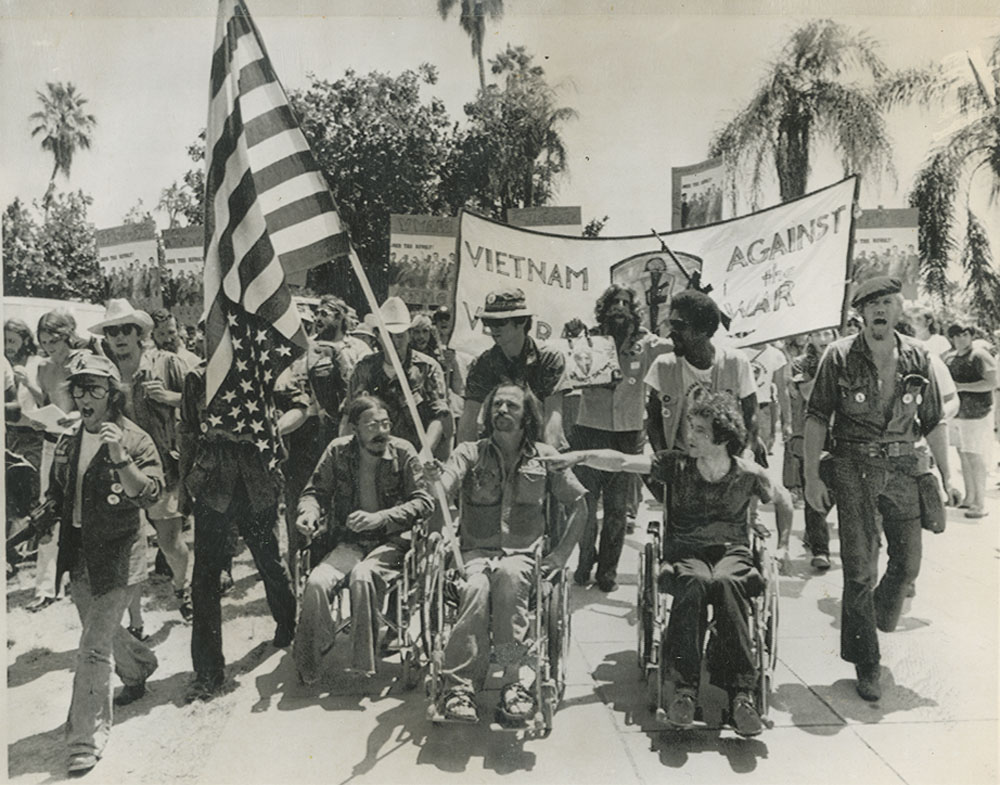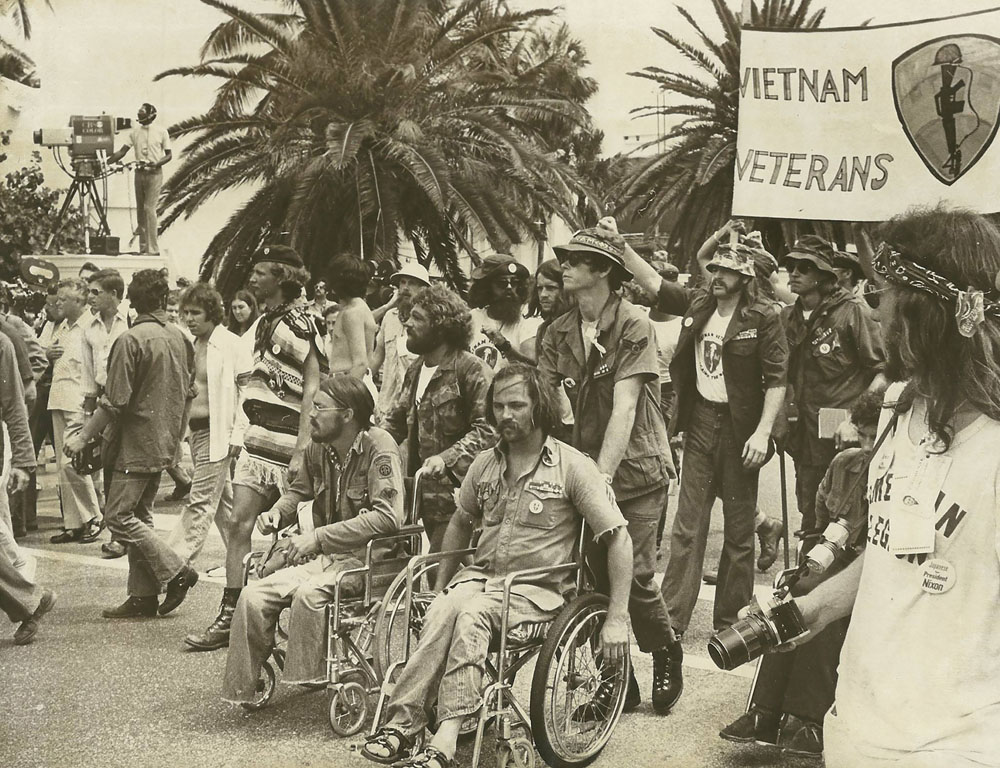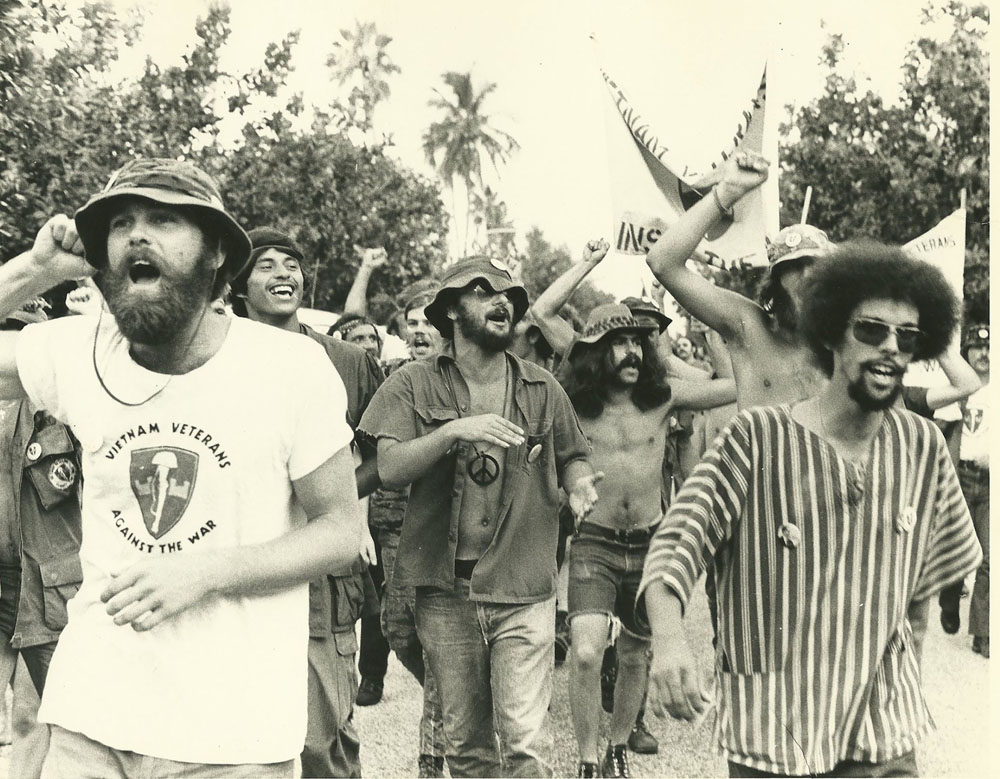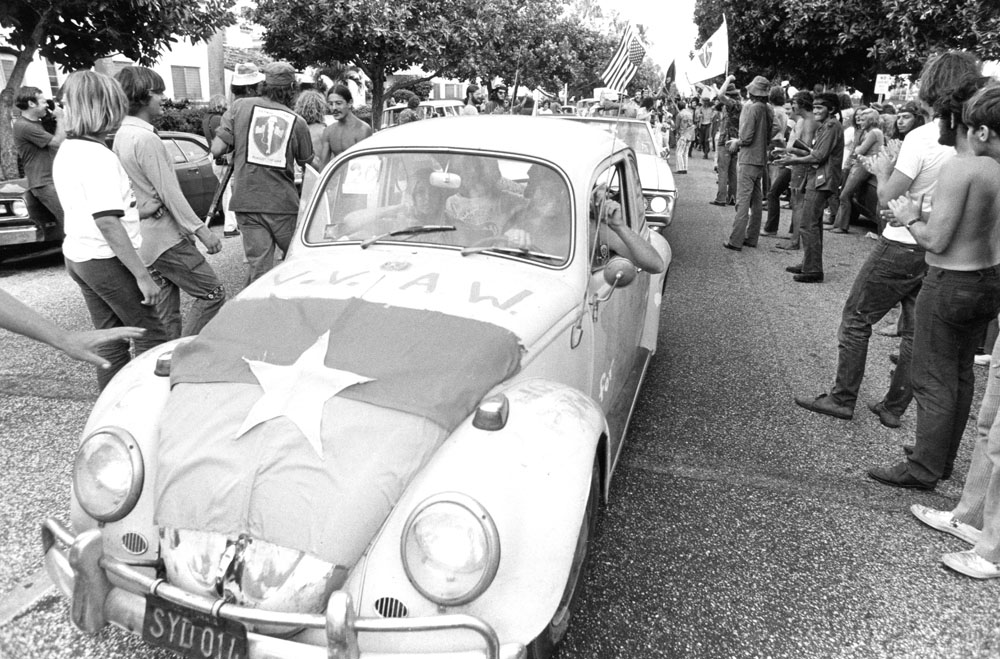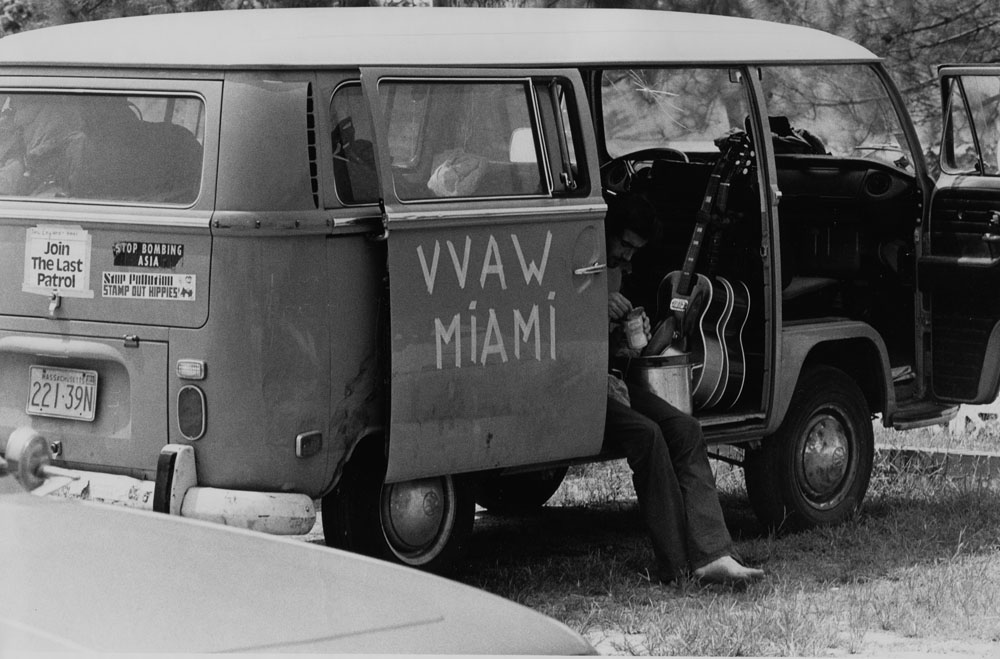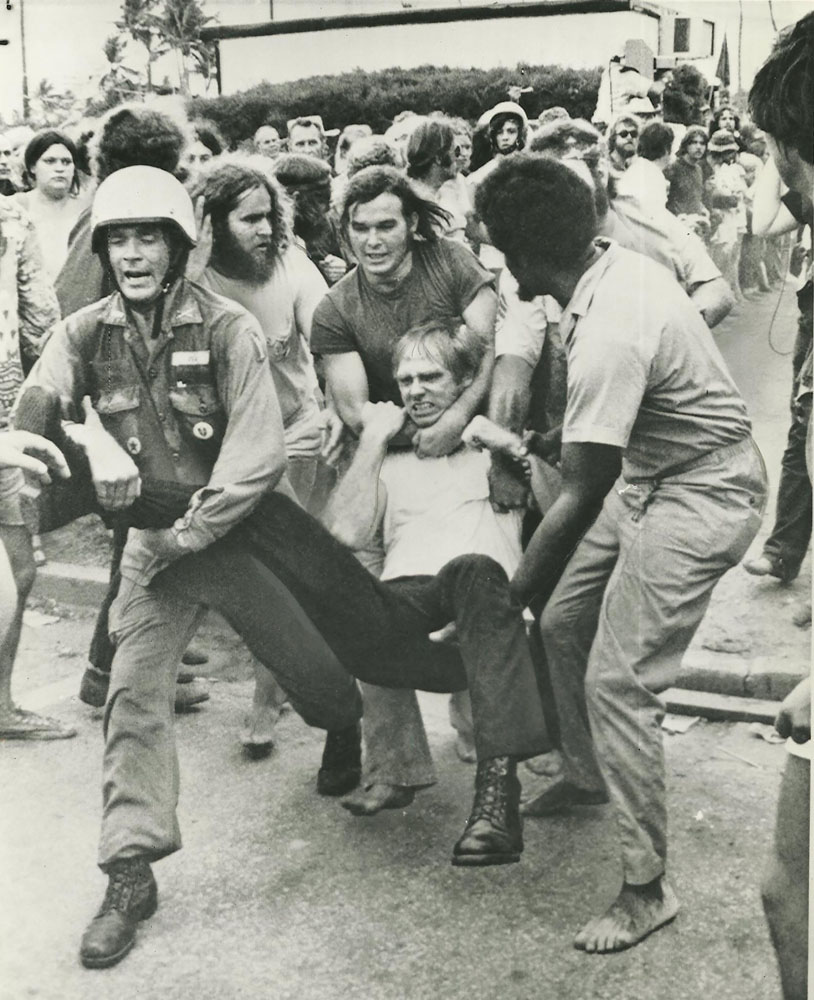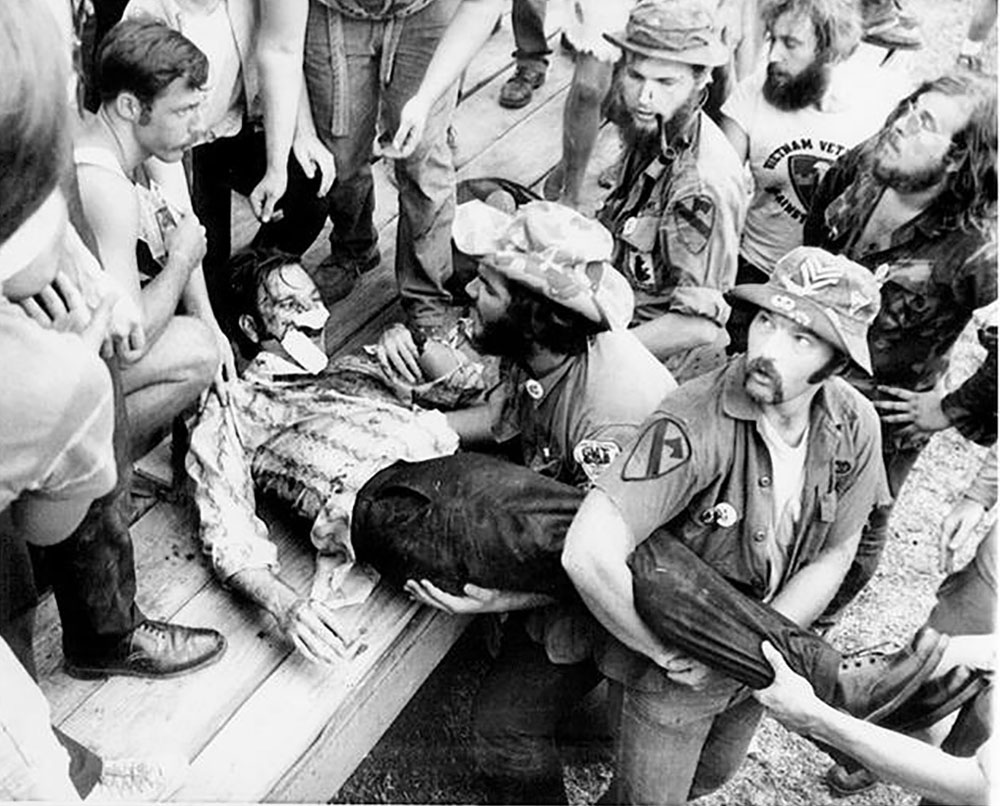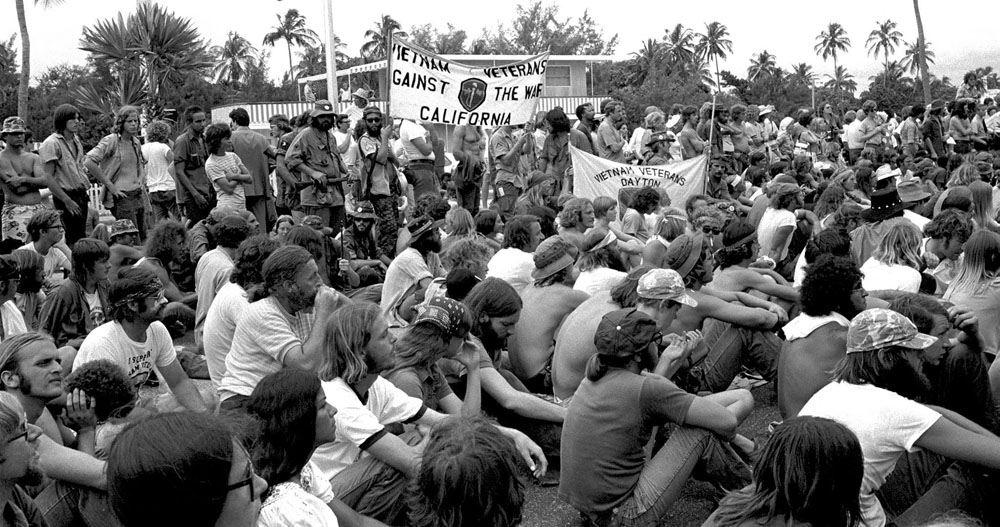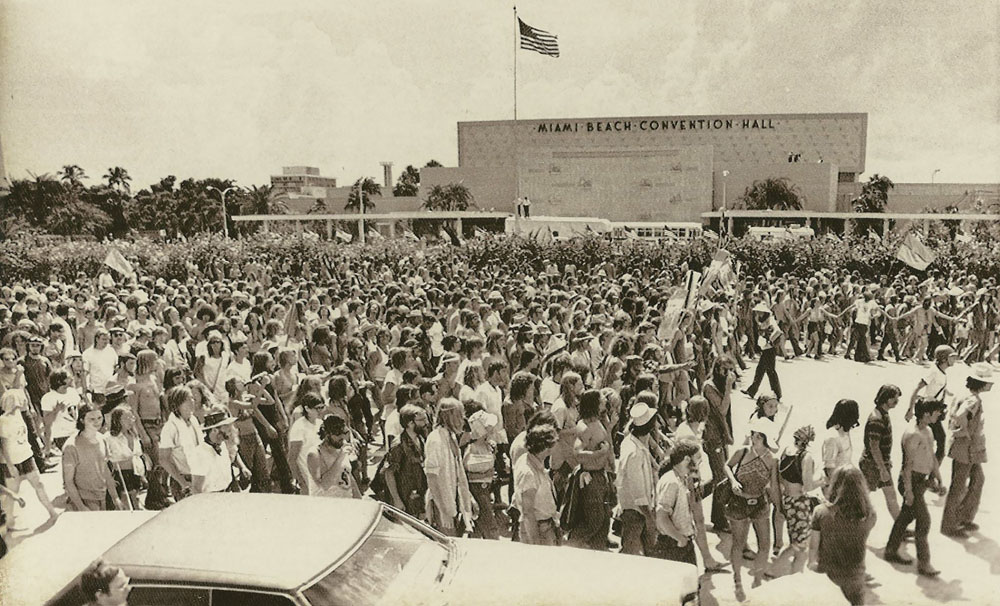 |
The Last Patrol: 1972By as told to Richard StacewiczFrom Richard Stacewicz's Winter Soldiers pages 307-313. With the end of the Democratic convention, VVAW members converged on Miami for the Republican convention. Veterans began to arrive in Miami Beach on August 19 and 20 to prepare for the convention, which was to take place between August 21 and August 24, 1972. Ann Hirschman (AH): First we got the land opened up. The day we opened the land was a day before the vets' convoy came. John Kniffin: These convoys were coming from three different parts of the country—the northeast, west, [and] midwest—all converging on Miami. They were so massive that at one point they completely blocked the Tamiami freeway when some cop was rash enough to tell the lead car to pull over for going below the speed limit. So the lead car pulled over to one of these cop stations and everybody started following him. They ended up filling up the substation parking lot and blocking up all four lanes of the Tamiami freeway before the cop says, "Get out of here." Lee Thorn: Coming down the east coast, they stopped off at all these military bases. Every time they got to a military base, the doors opened, the guys went in, there'd be cheering and shit. They'd bring them beer. I think we inspired them. It was OK to resist. It was OK to get organized. We supported them. They knew that when we said we'd do something, we did it. It was like we were still in Vietnam. Tom Wetzler: It really was a wonderful convoy in a lot of ways. I remember I was in Flamingo Park when the main convoy came in. I had gone early to pick up a friend of mine. It looked like a scene from the liberation of Paris. You hear this rumbling in the background and people are saying, "The vets are coming!" They all ran to the fence, and coming down the street is this convoy. The convoy had met at Daytona Beach, and then from there, it was one massive convoy. I seem to remember "When Johnny Comes Marching Home" whistled somewhere. There was someone with a helmet full of joints, passing them out. It was real exciting. AH: After we had the land set up, the Nazis goose-stepped in. Barry Romo (BR): The Nazis grabbed the stage in the middle of Flamingo Park. I saw them getting on the stage. So I run up on the stage to fight them and they fucking knocked me and threw me off, just in time for 1,500 vets to land. [Laughs] AH: I watched the ring of guys close in around the Nazis. Steve and Danny were on the stage. One of the Nazis made the stupid mistake of picking up a chair and hitting Steve. Danny picked up the chair and hit the Nazi. The chair exploded on the Nazi's head. They never did find the rest of the chair. He's doing some real dramatic bleeding and Danny says, "Four vets on each Nazi." BR: We got up there and formed a cordon around them so that the demonstrators couldn't kill them. We gave them a minute to leave. They said no. We rushed them and kicked the shit out of them, drug them with their faces down on the concrete. The police stood by and laughed, because this is Miami Beach police. AH: You have to understand, we are in South Miami Beach, where every Jewish working-class person from the entire eastern half of the northern tier of the United States retired. A bunch of them were Holocaust survivors. At first, they were not happy with this encampment in their park, real unhappy with the counterculture, and terrified out of their sweet little old brains of anyone that looked wild. The vets looked wild and weren't the happiest crew in the world because they had to babysit for the yippies. BR: After we kicked the Nazis' butts, it was hilarious, because then the Jewish women who wouldn't support us in Flamingo Park before were over there, "You need lights? We'll get lights. You need toilets? We'll get toilets. You guys kicked Nazis' ass!" Yeah, right, we're not fascists; we're anti-fascists. AH: It was the dream of their life. This little old guy comes up to me and says, "We're very grateful." [She simulates an eastern European accent.] I said, "They're really very good boys. They really won't hurt you and they're not here to mess up the neighborhood. If we can help..." "Darlink, you've already helped more than you could realize." One of the ladies said, "What can we do for you?" Suddenly, we're drowning in chicken soup. The vets like to eat. We were up to our sweet little ears in soup. I made the stupid mistake of mentioning that they had a passing fondness for beer. For the next two days, we almost had enough beer. They sent trucks. They were just incredibly grateful. It cemented our relationship. Nobody could hurt these vets. BR: We're in Flamingo Park, but we're separate, because there was just too much insanity with the other groups [yippies, zippies, etc.]. People just didn't feel secure, and we're vets, and vets like to feel secure no matter where they're at. So we set up our own camp with our own security, and people couldn't walk through unless we said. Jack McCloskey (JKC): People were trying to come in trying to sell us heroin . . . every kind of dope you can think of. We had walkie-talkies. People couldn't come in unless we cleared them first, and then they had to go with someone. It was like a military base in Vietnam. We knew that we would be infiltrated by people. We also knew we wanted to separate ourselves from political crazies, no matter what organization they came from. Sheldon Ramsdell (SR): We were kicking informants off the campground at Flamingo Park every day. The media came in, and some of them weren't media at all. How did you know? SR: They didn't know how to behave. They didn't know how to fit in. You just knew there was something off here. He's taking photographs and he's got a microphone and he's only turning the machine on when you're giving your name, address, and serial number—that kind of thing. Obviously, you're not there to help us in any way. Maybe you are, but we're not convinced and you really have to leave. We take a picture and two guys would escort him off. He would be very upset. It only happened two or three times, but once was enough.
SR: We marched silently from Flamingo Park to the Doral Hotel, where Nixon was. Pete McCloskey [a congressman from California] came up with bottles of Coca-Cola and handed them out; and I remember Mary McGrory wrote, "This terrorist group had bottles in their hands and no one threw a Molotov cocktail that day." [Laughs.] On Tuesday, August 22—the second day of the convention—the veterans held what was to be its most dramatic protest. VVAW members once again marched silently, this time to the Fontainebleau Hotel, the center of the convention activities. As the journalist, Hunter S. Thompson recalled, "The silence of the march was contagious, almost threatening. ... The only sounds I remember hearing were the soft thump of boot leather on hot asphalt and the occasional rattling of an open canteen top." This march, however, received no other attention from the media. SR: I was up at the Fontainebleau Hotel with Peggy Kerry [John Kerry's sister] and Hunter Thompson and all these other types [in an exaggeratedly deep voice], listening as the march was beginning. I was going to get down there with the unit. I went down and Rocky Pomerance, the chief of police in Miami Beach, was among the heads of the National Guard [and] Secret Service—all these military and police officials of the brass standing in a circle—and I overheard him saying, "Well, there's some people in this march throwing things and breaking windows." I just went right over there... He already knew who I was. "This is Shelly Ramsdell, the PR dude with the Vietnam Veterans Against the War." I says, "I want to tell you this is going to be a peaceful march. There's going to be no trouble. If anyone causes trouble, isolate them—I don't care what you do. This has got to be peaceful; everything counts on this." He was wonderful. He says, "Look, all right. Everybody get into the car." I don't know if I want to do this, but I get into the car. We get near the march, and I say, "Let me out here. [Laughs.] I don't want them to see me getting out of your car." Rocky, who was our pal, says, "Well, we'll isolate them." I says, "What are you going to do?" "Well, we'll pick them up. We got these U-Hauls-no windows, no ventilation—we'll stick them in there." I said, "Oh, shit." [Laughs.] Bobby Muller (BM): We went to the Fontainebleau Hotel, and we demanded a meeting with Nixon. We had all the VVAW people out there in the streets. We had an awful lot of people. They wouldn't let us in. At the Fontainebleau, 500 heavily armed police officers confronted the marchers. No violent confrontation took place on that day, the veterans dispersed peacefully. However, on the next day—the day Nixon was to accept his party's renomination—they returned en masse to the convention site. Once again, they were confronted by the police. BM: Myself, [Ron] Kovic, Bill Wyman—a double amputee—and I think a couple of other guys made it into the lobby of the hotel. We read a statement to the press. Somebody called in a bomb threat. It was just getting an excuse to get us out. So they kicked us out. I remember we were in the front. The cops were several deep with the batons and masks. The guys like [Ed] Damato and others were saying these guys had volunteered for this duty, they wanted to crack heads, that there would be bloodshed. I said, "I'm not leaving." Danny Friedman: The state police took over duties from the Miami Beach police because they thought the Miami police were too sympathetic. They had a Democratic mayor but a Republican governor, and he ordered the state police in and they were like storm troopers. SR: In the beginning, I guess there were a few anarchists wearing masks ... who threw the smoke bombs and then burned the police barricades. I said, "This is it," you know. BR: Then the demonstrations happened. People would sit down in the street, and they would be arrested nonviolently. Some people would go out and trash. VVAW has never believed in trashing. We always thought it was counterproductive. We always believed that all it is is a bunch of little children acting out their own frustration, and you can't win people over by setting fires to their stores. We made tons of mistakes but never made the mistake of thinking that setting a trash can on fire could change the world. The police assaulted; it was a police riot. The police were beating people up and gassing people and everything else. We went out dragging people off the street who had been hurt real bad or who had been maced, getting them to hospitals and stuff. Linda Alband: I was back like behind the lines and we got tear-gassed anyway. The tear-gas got lobbed in the wrong direction. I was with a bunch of senior citizens who were very severely damaged by the tear gas and choking. I thought some of them would have heart attacks. So I went to the police who, it had been advertised, would have water and stuff like that. I tried to get them to give me some so we could wash these people's faces off. They wouldn't even talk to me. They were just standing there. JMC: I got tear-gassed . . . I was treating an old man that got tear-gassed and I remember yippies coming up, saying, "What the fuck are you doing? This guy's your enemy." I'm saying, "Hey, I'm treating this man; he's dying from the tear gas." They took my hand, put it in a car door, and slammed the car door, breaking my two fingers. BM: At that time, Congressman McCloskey from California had aides that were there. They gave me passes to go in as a delegate because McCloskey, who had run for president, had been denied through the RNC [Republican National Committee] the ability to use the forum of the Republican Convention to make an anti-war statement. They procedurally shut him out. He was very pissed. So Wyman, myself, and some walking guy [that is, not in a wheelchair] went in as alternate delegates. We had been gassed and all that stuff approaching the convention. It was bedlam, but we had our alternate delegate passes and we got in. Somehow, while we were inside, Kovic showed up. I don't know how Kovic got in, but he ended up joining us. We just sat there and waited for Nixon. When Nixon came on, we waited for the place to get silent and did what I consider the bravest thing that I've done, which is: took a deep breath, leaned back in the chair, and just shouted at the top of my lungs, "Stop the bombing; stop the war." Then we picked it up as a chant, "Stop the bombing; stop the war." The Secret Service was right around us, because we were dirtbags. We were wearing camouflage and stunk to high heaven. They said, "What do we do, what do we do?" While they're trying to figure out what to do, we're just steady screaming. They finally said, "Throw them out." Delegates spit on us and went a little crazy. They threw us out a back door. Thank God they shut the door, because the delegates wanted to kill us. I remember, in traditional VVAW fashion, we reconvened at the city dump in Miami. That was the rendezvous point, the garbage dump. Can you imagine? I went to the garbage dump and said, "That's it. I'm out of here. Get me to the airport." [Laughs.] Copies of Winter Soldiers can be purchased through Haymarket Books at www.haymarketbooks.org/books/859-winter-soldiers
|

